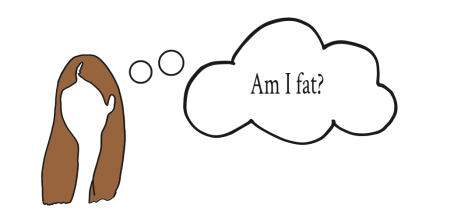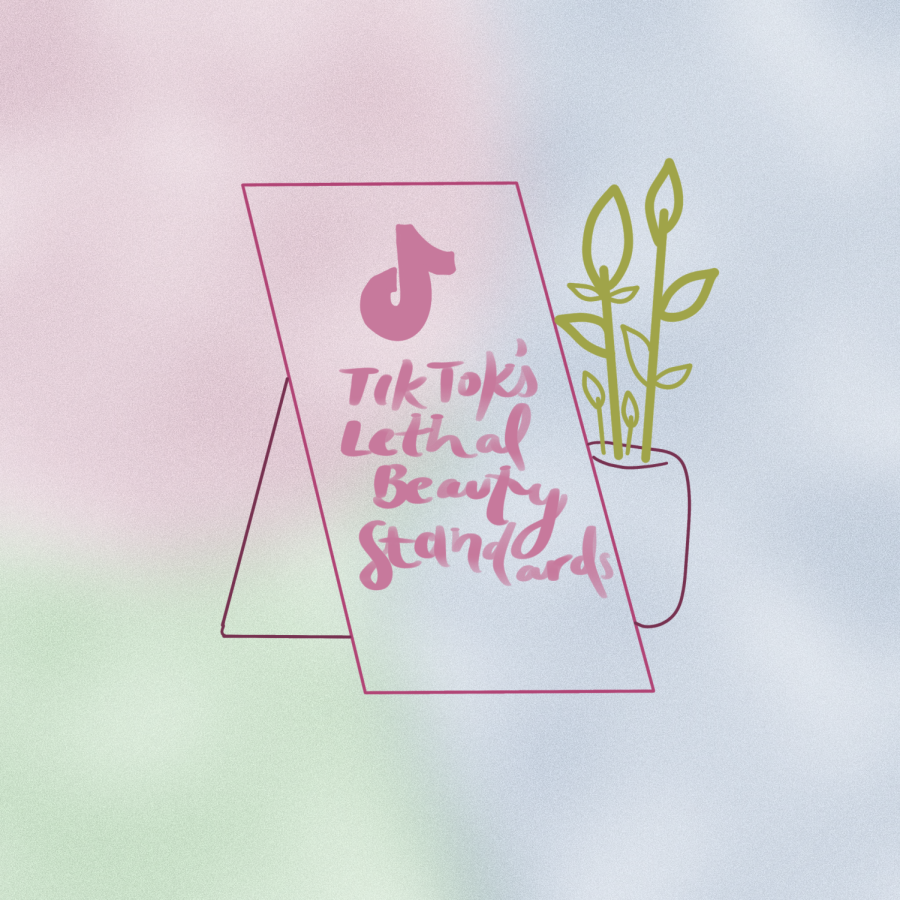TikTok’s lethal beauty standards
May 12, 2022
Social media has been on the rise since the early 2000s and with popular apps like Instagram and Snapchat gaining more users every day, it’s clear that it won’t be slowing down any time soon. However, around 2018 the new social media app, TikTok launched to immense popularity, skyrocketing in numbers and surpassing Instagram and Snapchat in popularity.
TikTok has since become the go-to place for short-form content and has been deemed as the perfect place for original content and trends alike, however as more and more people began using the app, users are beginning to unveil the app’s dark underbelly. Inside the comments of every short and silly video are complex layers of body shaming and harassment.
Creators are facing harassment
In late 2021 popular TikToker, Amelie Zilber posted a TikTok participating in the Vogue trend. She shared photos of her from the set of a modeling photo shoot in which she wore a small blue bikini. Commenters were quick to call her pretty, some asking for her to “drop her workout routine” while others asked how she was able to create the makeup looks from the photoshoot.
However, when plus-sized creator Adrie Tranoza posted a similar TikTok she was met with an entirely dissimilar response. The influencer’s comments were flooded with body-bashing insults and other offensive remarks. Viewers across the world were telling Tranoza “Eat less” while others were claiming her appearance made them feel physically nauseous.
Zilber is far from the only victim of body shaming, 15 year old Elsie Acomda had a similar experience on the popular social media app. In early July the young TikToker posted a video side by side with the social media star Charli D’Amelio. As she posed in a bathing suit identical to D’Amelio, Acomda captioned the video “Proof not only skinny girls can wear bikinis.”
The post was met with immediate backlash.
Acomda’s comment section was filled with insulting remarks about her body. Comments like “Just because you can wear one, doesn’t mean you should ” received 3 thousand likes, and “Fat girls are the REAL pandemic” got over five hundred.
Both Acomda’s and Tranoza’s respective audiences rallied together in support of the young women. The fans claimed that the atmosphere that Tiktok is fostering is resulting in body shaming and causing girls to be more susceptible to eating disorders.
TikTok users are being harmed
Studies are beginning to show that TikTok has caused eating disorders to be at a record high, occurring up to 7.8% more in teens than they did at the time of the app’s launch. TikTok is quickly becoming infamous for its lack of body tolerance. With over 60% of feminine users reporting being body-shamed on the app, in one form or another, it’s becoming evident that these seemingly harmless comments are beginning to detrimental effect on real girls.
When surveyed, researchers found that the overwhelming majority of young women on TikTok have said that the app negatively affects their body image. DGS Junior Abbey Rosko speaks to her experience dealing with the app’s beauty standards.
“It’s horrible to see all the body-shaming on TikTok. That’s part of the reason I deleted (the app). It just made me feel so bad about the way I looked. I think all social media is just that in a way, but it’s probably the worst in TikTok because it’s so easy to be anonymous, so no one will come at you for being mean,” Rosko said.
Rosko is far from alone, several girls in the DGS community attested to the app hurting their self-image and body confidence. Junior Amelia Giuffre was especially hurt by the double standard plus size user has to face on the app.
“Some trends are to show off different parts of the body that apply to specific beauty standards like an hourglass waist or defined facial features. A big part of TikTok is trendy clothes. Every fashion trend is targeted at skinny people. Revealing clothes too baggy jeans are seen as fashionable and trendy but when those clothes are on a bigger body type it is seen as sloppy.” Giuffre said.
The double standard of trends being acceptable on thin bodies while being unacceptable on larger bodies isn’t by any means new, but due to the popularity of the app, the effects of body shaming are starting to hurt more people, more quickly, with fewer repercussions. A study conducted in 2021 found that rates of anorexia were over 20% higher in female TikTok users than in non-TikTok users. DGS Junior Abbey Rosko firmly believes that the beauty standards being imposed on the app are responsible.
“It’s very obvious there’s a double standard. If a skinny girl posts a video showing off her body the comments are usually completing her, her looks, her lifestyle, her personality, but if a fat girl were to post that the comments would just be cruel, they’d be mocking her, and as a woman, it’s really disheartening to see,” Rosko said.
Restrictions on bullying
The type of body shaming we see on TikTok stems from the very complex social issue of beauty standards. These standards, ever-present in our real life, are amplified online due to the anonymous nature of social media apps. With hate comments remaining public it’s becoming easier for girls to become exposed to body shaming, unlike Instagram which has a feature allotting the original poster full control over their comment section TikTok utilized a more “free rein” approach allowing virtually any comment to be posted and remain up for all eyes to see.
“You see a lot of hate comments from people with no profile picture or ident dyes in their bio, all you can do is report their comment and hope it gets taken done, but that never really happens, so all the body-shaming usually just stays public,” Rosko said.
Behavioral studies have revealed that online anonymity can often lead to people acting more offensively. This phenomenon is likely what is behind the app’s intense negativity. DGS Consular Tiffany Rojszyk further attested to this statement.

“When you’re hidden behind a screen it’s easier to blend in with the crowd. If you [believe you are] anonymous you’re not going to be concerned with facing repercussions for your actions, no matter how harmful they may be, which is why we see so much bullying online, and with no consequences, there’s no reason to stop,” Rosko said.
The environment TikTok is fostering is no help either, with the lack of restrictions for comments, harassment is ten-fold. TikTok users across the country have been calling for stronger community guidelines as a potential solution to the app’s issue with body shaming. DGS Junior Danielle Whitman believes that the decision to restrict the section on Tiktok could be a fair way to limit the bullying in comment sections.
“I know some people might argue that it’s taking away from free speech, but most other social media apps have some sort of community-controlled comment section and it doesn’t really affect that. I’m just tired of seeing the negative comments so I’d definitely support anything that helps get rid of that,” Whitman said.
As of current TikTok has issued no statement concerning their community guidelines and issues with harassment.




